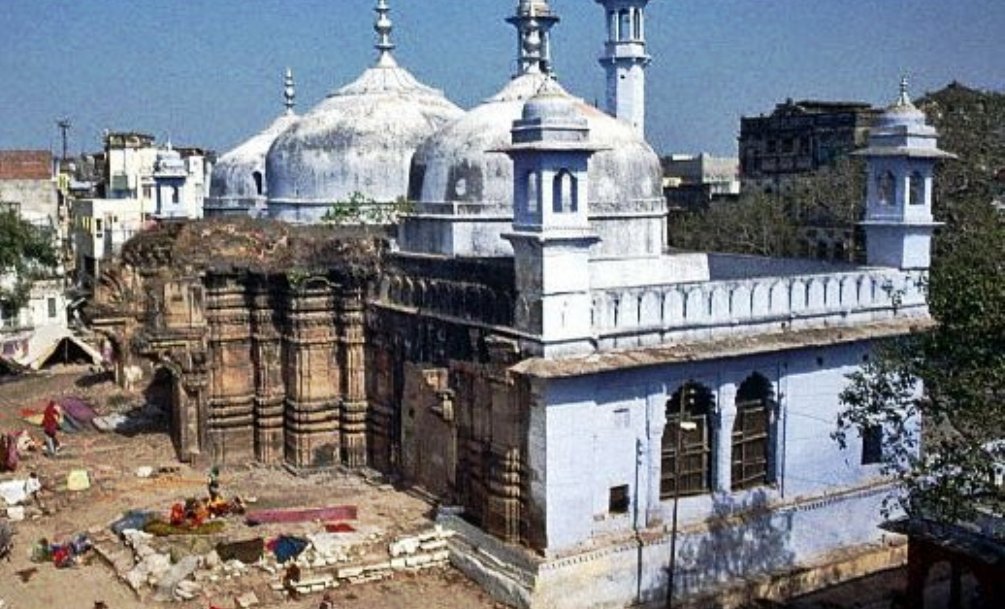Priyanka Singh
Published on: 13 September 2022 at 18:03 IST
The Varanasi Court on September 13th, 2022, dismissed the Anjuman Masjid Committee’s plea filed under Order 7 Rule 11 CPC, challenging the maintainability of the suit filed by five Hindu women, who are plaintiffs seeking worshipping rights in the Gyanvapi Mosque compound.
As observed by District Judge Ajay Krishna Vishwesha, the suit of the plaintiffs is not obstructed by the Places of Worship (Special Provisions) Act, 1991, The Waqf Act, 1995, and the U.P. Shri Kashi Vishwanath Temple Act, 1983, as claimed by the Committee, which manages the Gyanvapi Masjid.
No bar under the Places to Worship (Special Provisions) Act, 1991
The maintainability of the suit was decided on the basis of the Places of Worship (Special Provisions) Act, 1991, where it was claimed by the Hindu worshippers that the Hindu deities were being worshipped inside the mosque’s compound even after the date of August 15th, 1947, which is also the cut-off date as per the Places of Worship (Special Provisions) Act, therefore, being extraneous to the suit.
This Act stated that places of worship in the country must remain as they were on August 15, 1947, and that conversion of a place of worship to another religion “shall cease.”
“In the present case, the plaintiffs are demanding the right to worship Maa Sringar Gauri, Lord Ganesh, and Lord Hanuman at the disputed property, therefore, Civil Court has jurisdiction to decide this case. Further, according to the pleadings of the plaintiffs, they were worshipping Maa Sringar Gauri, Lord Ganesh at the disputed place incessantly since a long time till 1993.”
“After 1993, they were allowed to worship the above mentioned Gods only once a year under the regulations of the State of Uttar Pradesh. Thus, according to the plaintiffs, they worshipped Maa Sringar Gauri, Lord Hanuman at the disputed places regularly even after August 15, 1947. Therefore, The Places of Worship (Special Provision) Act, 1991 does not operate as a bar to the suit of the plaintiffs and the suit of the plaintiffs is not barred by Section 9 of the Act,”the Court remarked.
The Court also clarified that the plaintiffs had not claimed ownership of the disputed property and hadn’t filed the suit for declaration that the disputed property is a temple; hence, the Places of Worship Act has been negated in the case.
“It is neither more nor less than any of the places of worship of the other religions. Obviously, the acquisition of any religious place is to be made only in unusual or extraordinary situations for a larger national purpose, keeping in view that such acquisition is available for a mosque like any other place of worship of any religion,” the Court observed.
In another contention, the Court observes that the destruction of the idol doesn’t result in the stoppage of the presence of the idol itself; the legal personality created by the endowment continues to survive. This was indicated by the reference to the submergence of various deities in water as a matter of religious practice. It indicated how even after submergence, the deities’ pious purposes were fulfilled and their existence was not wiped off.
No bar under the Waqf Act, 1995
Also, the Court, on observing the bar u/s 85 of the Waqf Act, can see how the plaintiffs, being non-Muslims and unknown to the Waqf, have not claimed reliefs available under Sections 33, 35, 47, 48, 51, 54, 61, 64, 67, 72, and 73 of the Waqf Act, therefore the suit is not barred by Section 85 of the Act.
No bar under the U.P Shri Kashi Vishwanath Temple Act, 1983
The U.P Shri Kashi Vishwanath Temple Act, 1983 does not impose any bar regarding the right to idol worship in the endowment within or outside the premises of the temple, as claimed in a suit.
Accordingly, the plea filed by the Anjuman Islamia Committee under Order 7 Rule 11 CPC was dismissed and the Court has fixed the date of September 22, 2022 for the filing of a written statement and framing of issues.

